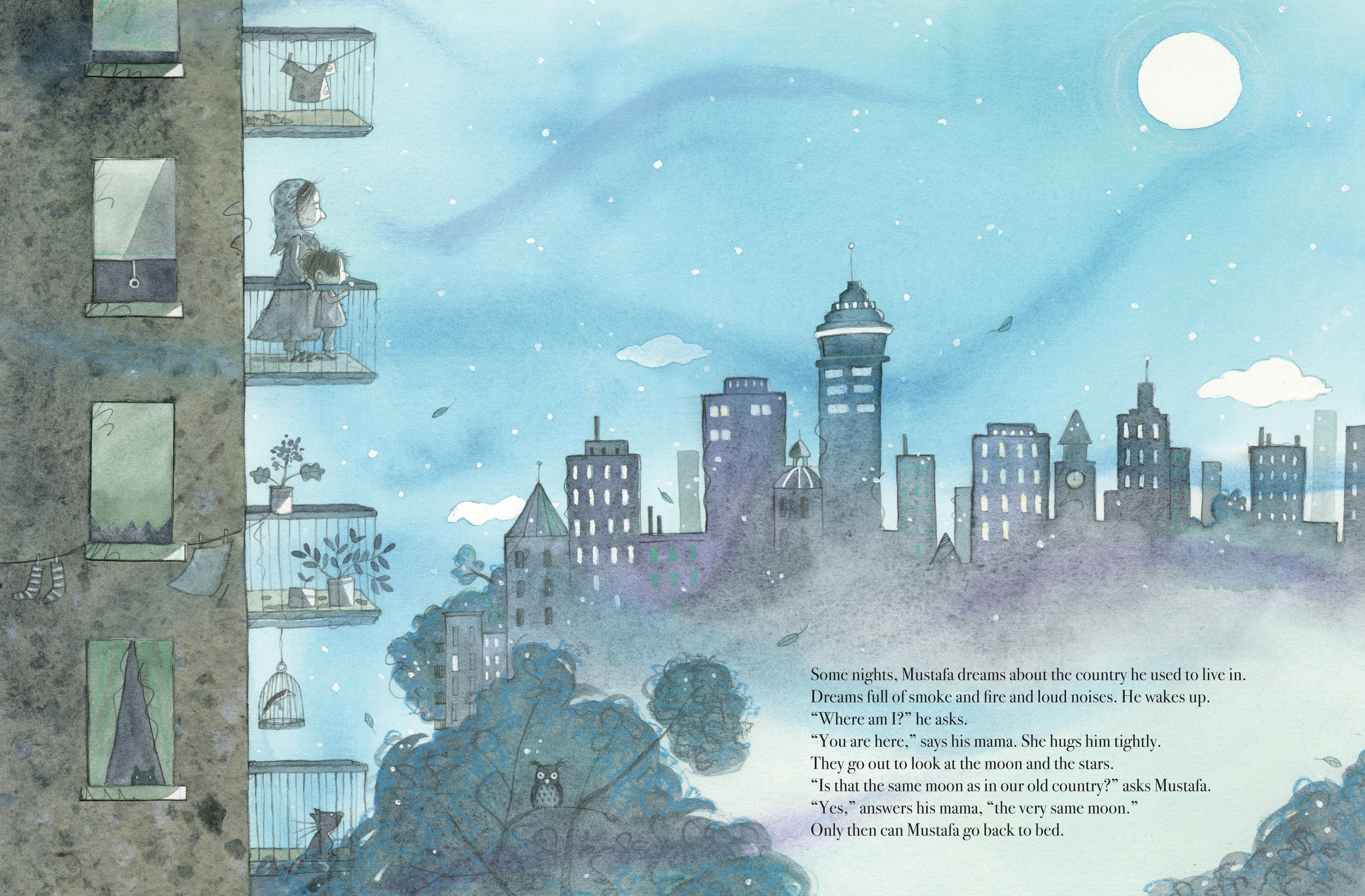Mustafa, how the story began...
The idea, the seed, the spark that led me to write and illustrate the story of Mustafa began when I traveled to Croatia and Serbia a couple years ago. The alarming and tragic news of refugee families fleeing their countries, sailing unsafely across the sea, walking for days and weeks through fields, forests, over barbed wire fences and walls to get to a place where they could find a haven, had been in all the media for months.
When I arrived in Belgrade, a large park in the center was filled with families in makeshift shelters waiting to continue on the next leg of their journey. What struck me were the children running around, playing, laughing, seemingly oblivious to the situation, absorbed in their moments of play and flights of imagination, as are children all over the world. I was astonished at their resilience.
Since the act of writing for me is, in part, a way of finding answers to my questions, I wondered if these children carried memories of danger, violence and sadness within them. Were they afraid or hopeful of what would happen next? This started me on the journey of imagining how a child would see and understand his new country...
Mustafa discovers his new world bit by bit, noticing the tiniest details that are different or similar to the country he has come from. The moon in the night sky, the landscape, the weather, the color of the trees, the insects, the flowers, the music...
He is curious and aware, but still, he feels invisible and mute in this world where people speak a language that he cannot understand. How will he create a bond with his new environment? When finally Mustafa conquers his shyness and vulnerability, he meets a friend, with whom he shares smiles and laughter... he is on the road to becoming visible...
I realized, as I wrote Mustafa's story, that his experience will also be recognized by children who arrive in new neighborhoods, new schools or new families. I was five years old when my family moved to a province where English was spoken. I spoke only French and I clearly remember my first day in kindergarden. I was terrified I could not understand a single word. I spent the day hiding under a table. Hopefully, Mustafa's story will help children and adults become aware that the experience of being invisible, different or lonely is a part of many a childhood.
Mustafa, venu d'ailleurs
L'idée d'écrire et illustrer l'histoire de Mustafa m'est venue lors d'un voyage dans les Balkans il y a quelques années. Les nouvelles étaient remplies des histoires tragiques des familles de réfugiés qui fuyaient leur pays dans des embarcations fragiles ou à pied, à travers champs et forêts, franchissant fils barbelés et murs pour trouver un refuge et la paix. Lorsque je suis arrivée à Belgrade, un grand parc au centre de la ville était rempli de familles de réfugiés qui attendaient sous des abris de fortune de connaître la prochaine étape de leur voyage. Ce qui m'a surpris, c'était de voir les enfants qui couraient, riaient, jouaient, inconscients, absorbés par le moment présent et leur imagination ludique comme tous les enfants du monde. Étonnée, je découvrais leur résilience.
Puisque l'écriture est pour moi un cheminement pour trouver des réponses à mes questions, je me suis demandée si ces enfants portaient en eux les souvenirs du danger, de la violence et de la tristesse. Avaient-ils peur de l'avenir? Avaient-ils un peu d'espoir? Sauraient-ils se retrouver dans un pays inconnu et étranger? J'ai donc écrit Mustafa.
Mustafa découvre son nouveau pays petit à petit. La lune, les paysages, le saisons, la couleur des arbres, les fleurs et les insectes et la musique lui rappellent parfois l'ancien pays ou, au contraire, l'émerveillent par leur nouveauté et étrangeté. Malgré tout, il se sent invisible et muet dans ce monde où les gens parlent une langue qu'il ne comprend pas. Comment pourra-t-il créer un lien dans son nouvel environnement? Comment pourra-t-il franchir la frontière de l'invisibilité?
En écrivant l'histoire de Mustafa, j'ai réalisé aussi que les enfants qui arrivent dans des nouveaux quartiers, des nouvelles écoles ou des nouvelles familles, s'identifieront facilement à l'expérience de Mustafa. J'ai espoir que l'histoire de Mustafa inspirera les enfants autant que les adultes à réaliser que I'expérience d'être invisible, différent et seul fait souvent partie de l'enfance.





















































